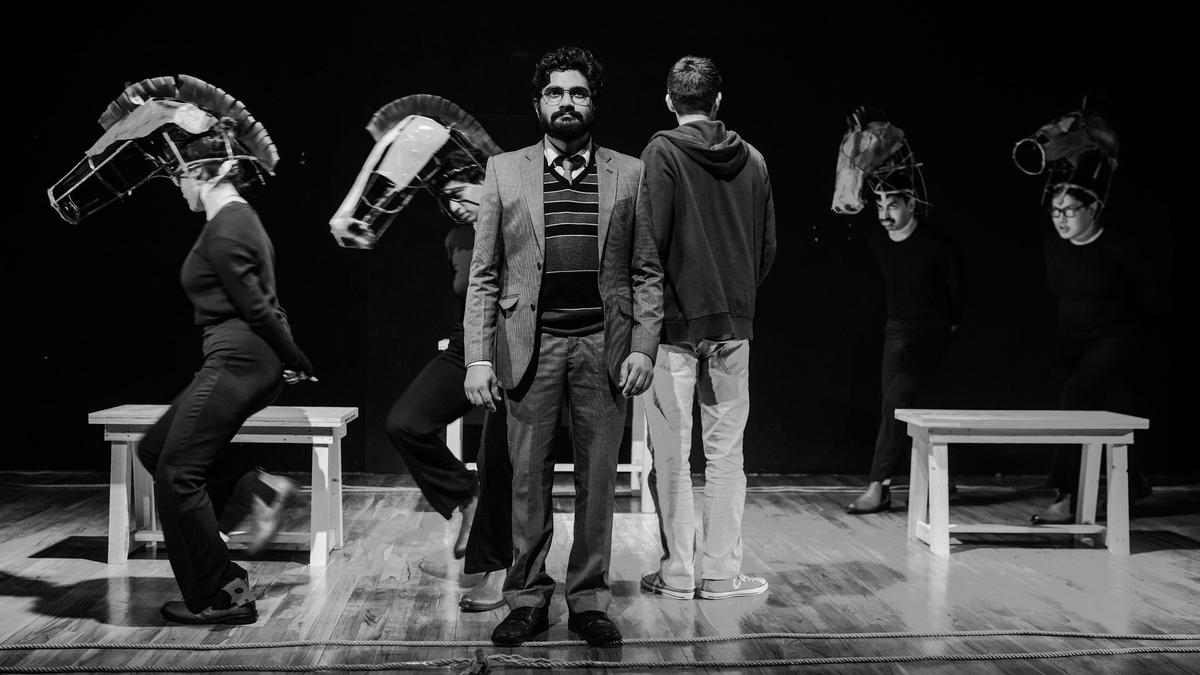Why should art delve into the murky, uncomfortable corners of the human psyche? According to Sukrit Mahajan, the director of Equus (reimagined by Playhouse Production), theatre is not just about entertainment — it’s about holding a mirror to the deepest parts of ourselves, even those we’d rather keep hidden.
Few plays embody this philosophy as profoundly as Peter Shaffer’s Equus, a searing psychological drama that lays bare the entangled forces of obsession, shame, and desire. First staged in 1973, Equus tells the story of Alan Strang, a teenager whose inexplicable act of violence — blinding six horses — sets the stage for an exploration of faith, repression, and the fragility of the human mind. Now, Sukrit brings this Tony-winning classic to Indian audiences, using shadow theatre and a profoundly personal lens to illuminate the shadows within.
“The first play I ever acted in was Equus,” Sukrit recalls, reflecting on his college days. “It changed the trajectory of my life and career. Revisiting it as my debut production with Playhouse Productions felt like coming full circle.”
This deeply personal connection, paired with Sukrit’s training at Drama School Mumbai, infuses his adaptation with fresh interpretations. Drawing inspiration from Carl Jung’s theory of the ‘shadow self,’ Sukrit examines the repressed parts of the psyche — those hidden, shameful truths we suppress even from ourselves. “Every character in Equus has a shadow self,” Sukrit explains, “It’s not just Alan or his psychiatrist Dr Martin Dysart. That’s what makes the play universal and deeply human.”
Sukrit Mahajan
| Photo Credit:
Special Arrangement
To bring this to life, Sukrit employs shadow theatre, a visual metaphor for the characters’ concealed desires and fears. Long curtains transform into screens where actors’ shadows loom larger than life, blurring the line between what is hidden and what is revealed. “Whenever a character’s shadow self is explored, it’s staged in the shadows, emphasising its intangible yet omnipresent nature,” says Sukrit.
This innovative staging (also the USP of this restaging of Equus is paired with a haunting soundscape of church organs, evoking the play’s themes of faith and fervour. “The music was a deliberate choice,” Sukrit notes, “Given the play’s ties to religion and Christianity, the church organ felt like the perfect auditory metaphor.”
While Equus is a towering work in global theatre — having featured stars like Anthony Hopkins and Daniel Radcliffe in past productions — Sukrit was unburdened by its legacy. “I never felt pressured to match prior productions,” he says. “For me, the goal was to create something thought-provoking, engaging, and true to the script.”
Still from ‘Equus’
| Photo Credit:
Special Arrangement
Yet this production isn’t just a tribute to Shaffer’s work — it’s also an exploration of societal taboos rarely addressed in mainstream Indian theatre. “Themes like sexuality, especially in unconventional contexts, aren’t often explored here,” Sukrit points out, “Equus forces you to confront discomfort, but it does so in a way that remains accessible to a broader audience.”
To ensure authenticity, Sukrit began rehearsals with 10 days of script readings, allowing the cast to deeply immerse themselves in the text before diving into blocking or themes. “I wanted the actors to arrive at their characters organically,” he says. This collaborative process extended to the use of ropes in abstract scenes, symbolising the forces of control and repression binding the characters.
Ultimately, Sukrit hopes Equus will leave audiences questioning not just the characters’ choices but their own buried fears and desires. “The play is, in many ways, a love story,” he reckons, “It’s about the extremes to which passion can drive us, the thin line between worship and obsession.”
Equus will be staged at Medai – The Stage in Koramangala on November 22 (7.30pm) and at Jagriti Theatre, Whitefield on November 23 (3.30pm and 7.30pm). Tickets on BookMyShow.
Published – November 20, 2024 04:42 pm IST
